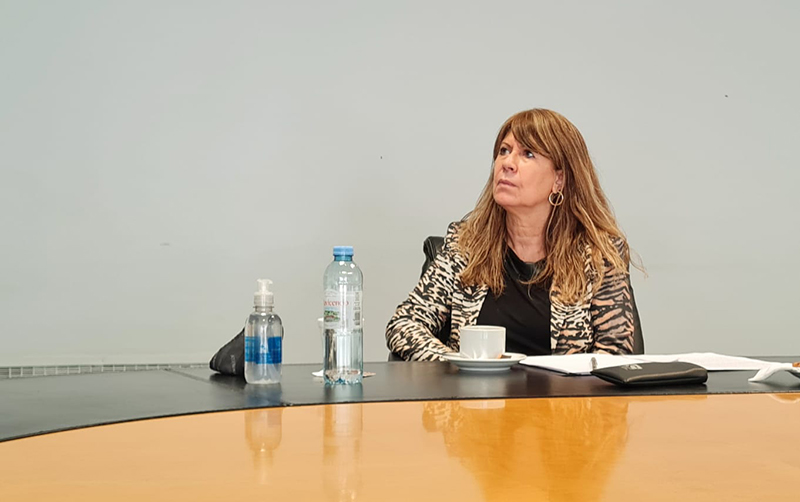Banks’ Women Directors Held an Online Meeting to Deepen Financial Institutions' Inclusive Policies

Private and public banks’ women directors participated in the second meeting organized by the BCRA. They analyzed the progress made in gender and diversity policies implemented by financial institutions since they met for the first time in 2020. They also discussed the resistance encountered along the way.
Betina Stein and Claudia Berger, members of the BCRA's Board, attended the meeting coordinated by Celeste Perosino, Promotion of Gender Policies, Respect and Appropriate Workplace Behavior Manager. More than 23 women leaders across the country were also present. They hold top positions in private and public financial institutions from all over the country: Banco de la Nación Argentina; Banco de la Ciudad de Buenos Aires; Banco Hipotecario; BICE: Banco de La Pampa; Banco de Inversión y Comercio Exterior; Banco Supervielle; Banco Servicios Financieros; Banco de Galicia; BBVA; HSBC; ICBC; Nuevo Banco de Chaco; Banco de Valores; Banco Municipal de Rosario; Banco de Formosa; Banco de Tierra del Fuego; Banco Roela; Banco Itaú; Banco Comafi; and Banco de la Provincia del Neuquén, just to mention a few. “Much work remains ahead of us. We've heard a great deal of inspiring ideas and I would like to highlight some of them: the importance of making men join gender-oriented areas; the need for getting more women into management roles; and the advisability of training in order to overcome the underestimation that we have been suffering for so long. In addition, I think it is essential to have disaggregated data for both providing support to users and for institutions to develop specific policies,” said Berger.
Stein added: “This is an enriching experience from which we gather data and information to analyze. I would like to underscore one of the points discussed by our colleagues: the need for women to move towards leadership positions in financial institutions so that the change in policies for women’s access to credit becomes palpable. As more women reach decision-making positions, lines of credit will be more oriented to the specific needs of female users." She also stated: "The BCRA and financial institutions have to work hard in the management of information related to the LGTTIBQ+ collective because data and statistics are not enough to make informed decisions.”
The meeting focused on the presentation and discussion of actions related to gender and diversity that have been taken in the past year by financial institutions. Some of the topics mentioned were the creation of specific areas to manage gender and diversity policies; the implementation of protocols to address violence and discrimination; the use of non-binary records and language in documentation and files; the follow-up of compliance with the regulation on fair gender treatment in advertisements and branches; the implementation of inclusive language guides; the creation of breastfeeding rooms and new types of leave for miscarriage and fertility treatments; the challenge of adopting gender-based affirmative policies on procurement; and the establishment of quotas for the promotion of women.
As for the financial system, the topics addressed included the need to create financial inclusion policies and to work on gender in an intersectional way to avoid biases in credit rating and to ensure access to financing tools by people from the most vulnerable groups, just to name a few.
"The different presentations agree on a common diagnosis and shared tools for mainstreaming gender and diversity goals. In spite of the progress already made, much work lies ahead to achieve gender parity in decision-making areas, to put an end to segregation of tasks and to promote policies on shared care and social responsibility. In terms of financial inclusion, the financial system should be considered as a public service that is rendered from a gender and diversity perspective in order to tackle inequality in the most vulnerable sectors, especially among women and LGBTTIQ+ people,” said Perosino.
At the first meeting, all participants agreed on the creation of departments on gender issues within their organizations and on the design of institutional policies aimed at generating more equal and inclusive work environments on the basis of both protocols to address violence and gender balancing policies. In addition, financial inclusion and education, as well as financial products designed from a gender perspective was a must for all participants. Likewise, the urgent need to formulate debt relief policies and offer gender-oriented financial products were acknowledged as strategic priorities so that women, lesbians, transsexuals, travesties and non-binary people could access credit under better conditions.
The second meeting was part of a joint and cross-sectional agenda furthered by the BCRA, bringing together public and private banks with the aim of making the Argentine financial system move forward in terms of gender and diversity.


October 15, 2021.




